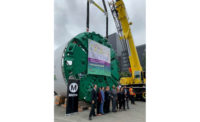Just weeks after opening the new Gold Line Foothill Extension, the Los Angeles County Metropolitan Transportation Authority (Metro) hopes to expand that light-rail system again, along with many other projects. It released on March 18 a draft spending plan that, if approved by the Metro board of directors on March 24, will ask voters to fund $120 billion in transit projects over the next 40 years.
The $1-billion, 11.5-mile extension of the original downtown Los Angeles-Pasadena Gold Line, from Pasadena to Azusa, is the first light rail in the U.S. to be built entirely with taxpayer money, Metro says. It was funded by Measure R, which raised the Los Angeles sales tax one-half cent in 2008 and fueled a $40-billion road-and-rail program (ENR 7/25/11 p. 9). But, in 2012, a ballot Measure J’s premise to extend that sales-tax increase by 30 years failed by a narrow margin.
If the agency’s board of directors approves, the sales-tax-hike proposal will become a ballot initiative up for a vote in November. It would ask for a half-cent bump to the 9¢ sale tax, starting in 2018, and an extension of Measure R past its current 2039 expiration date, to 2057.
Steven Polechronis, senior vice president with AECOM, called the proposed building program “historic.”
“With the Gold Line opening, the Expo Line to Santa Monica opening [in May] and a lot of repairs that have been made, Angelenos can really see the results,” he says. “The county approved Measure R in 2008, at the start of the worst recession since the Great Depression, so it recognizes the need for local transportation reform.”
Metro claims that support in Los Angeles is strong for transit. Because of its popularity, additional cars already have been added to the Gold Line since its opening on March 5. Now, Metro is trying to ride this momentum by unveiling its second ballot initiative effort.
“Anybody you ask has an opinion about traffic,” Polechronis says. “We’ll need rail, buses, streets and freeway repair. There needs to be a very balanced approach, and no one thing should be relied on too heavily.”
Rick Jager, spokesman for Metro, says contractors delivered the Gold Line extension on time and under budget, giving Metro the confidence to approach voters with another tax measure. “If these projects had a lot of cost overruns or other problems, I don’t think our case would be as strong.”
In its spending plan, Metro said it likely would tap the financial resources of the construction industry, noting, “Private-sector financing is only appropriate under certain circumstances, but it can also be a way to bring innovation to a construction project by giving the contractor, designer, and operator a financial stake in the outcome.”
How Metro prioritizes the construction schedule likely will continue to be a cause of controversy. Local media have documented that communities in the San Gabriel Valley threatened to sabotage the passing of Measure R in 2008 if the Gold Line Extension wasn’t one of the first projects built with the money.
Critics say this type of political wrangling means Los Angeles doesn’t have a system designed for maximum service to a broad geographic range, which contributed to the Measure J defeat. The communities newly served by the Gold Line should have seen an expansion of bus service, instead of a light-rail line, said a Los Angeles Times op-ed on March 14.
“Regional equity, return on investment, technical analysis, political relationships—all of that has to be considered with every single decision,” Polechronis said.
Jager says Metro has addressed tension over which projects get built by using a “bottoms-up approach” to developing plans for new projects. “These will be the projects that they wanted, and we know because we went out and asked them,” he says. “And the packed parking lots—the full trains since the Gold Line extension opened—have proved that those communities needed rail.”




Post a comment to this article
Report Abusive Comment